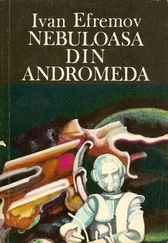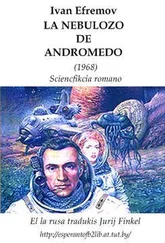Ivan Yefremov - Andromeda (A Space-Age Tale)
Здесь есть возможность читать онлайн «Ivan Yefremov - Andromeda (A Space-Age Tale)» весь текст электронной книги совершенно бесплатно (целиком полную версию без сокращений). В некоторых случаях можно слушать аудио, скачать через торрент в формате fb2 и присутствует краткое содержание. Город: Moscow, Год выпуска: 1959, Издательство: FOREIGN LANGUAGES PUBLISHING HOUSE, Жанр: Фантастика и фэнтези, на английском языке. Описание произведения, (предисловие) а так же отзывы посетителей доступны на портале библиотеки ЛибКат.
- Название:Andromeda (A Space-Age Tale)
- Автор:
- Издательство:FOREIGN LANGUAGES PUBLISHING HOUSE
- Жанр:
- Год:1959
- Город:Moscow
- ISBN:нет данных
- Рейтинг книги:5 / 5. Голосов: 1
-
Избранное:Добавить в избранное
- Отзывы:
-
Ваша оценка:
- 100
- 1
- 2
- 3
- 4
- 5
Andromeda (A Space-Age Tale): краткое содержание, описание и аннотация
Предлагаем к чтению аннотацию, описание, краткое содержание или предисловие (зависит от того, что написал сам автор книги «Andromeda (A Space-Age Tale)»). Если вы не нашли необходимую информацию о книге — напишите в комментариях, мы постараемся отыскать её.
Andromeda (A Space-Age Tale) — читать онлайн бесплатно полную книгу (весь текст) целиком
Ниже представлен текст книги, разбитый по страницам. Система сохранения места последней прочитанной страницы, позволяет с удобством читать онлайн бесплатно книгу «Andromeda (A Space-Age Tale)», без необходимости каждый раз заново искать на чём Вы остановились. Поставьте закладку, и сможете в любой момент перейти на страницу, на которой закончили чтение.
Интервал:
Закладка:
“I want to get some hard and lengthy job, with tough physical labour,” said Darr Veter, “something like the Antarctic mines!”
“All the jobs there are taken!” answered the registrar, in tones of sincere regret. “All the miner’s jobs on Venus, Mars and even Mercury have been filled too. You know that the young people are always anxious to go where the work is hardest.”
“That’s true but I can no longer place myself in that fine category. What is there now? I want a job immediately.”
“There are the diamond workings in Central Siberia,” began the registrar slowly, glancing at a list that Darr Veter could not see, “that is, if you want mine work. Then there are some jobs on the rafts of the oceanic food-packing plants, at the solar pumping station in Tibet, but that’s easy work. There are some other places, but nothing particularly hard!”
Darr Veter thanked him and asked for some time to think things over and asked him to keep the place open in the diamond workings.
He switched off the Registrar of Vacancies and tuned in to Siberia House, the centre for geographical information concerning that country. His televisophone was switched on to a memory machine that showed him the latest records and he saw pictures of extensive forests go floating past him. The boggy, scanty, larch forests growing on permafrost that had once occupied the region were gone for ever, giving place to such giants as Siberian cedars and American sequoias, trees that had formerly been in danger of extinction. Their gigantic red trunks made a magnificent fence round hills covered with ferroconcrete caps. Steel tubes, thirty feet in diameter, crawled from under the caps and curved over ridges to the nearest rivers that they sucked entirely into their huge scoops. Monstrously huge pumps roared dully. Billions of gallons of water were driven into the volcanic chimneys where the diamonds were found; the water whirled and raged as it washed the clay away and then found its way out again leaving behind tons of diamonds on the grids of the washing chambers. In long, well-lit buildings people were watching the dials of the sorting machines. The brilliant stones were sifted like grain through the calibrated holes of a screen into boxes. The pumping station operators were keeping constant watch over the calculating machines that computed the ever-changing resistance of the rock, the pressure and expenditure — of water, the depth of the shaft and the expulsion of solid matter. Darr Veter thought that though the joyful picture of sun-bathed forests did not suit his mood at that moment, the concentrated activity of the work at the pumps might suit him and he switched off Siberia House. Immediately the call signal rang out and the Registrar of Vacancies appeared on the screen.
"I’d like to give you something more concrete to think about. We have received a request for somebody to fill a vacancy that has just occurred in the submarine titanium mines off the west coast of South America. This is the hardest work available today, but if you take it you’ll have to go there immediately.”
That last piece of information rather upset Darr Veter. “But I shan’t have time to pass the tests at the nearest station of the Academy of the Psychophysiology of Labour,” he said.
“The sum of the annual tests that were obligatory for your former work is sufficient to exempt you from them.”
“Inform them that I’m coming and give me the coordinates!” answered Darr Veter immediately.
“Western section of the Spiral Way, seventeenth southern branch. Station 6L, Point KM40. I’ll inform them.”
The serious-looking face disappeared from the screen. Darr Veter gathered together all the little trifles that belonged to him personally and filled a box with films containing the photographs and voices of his nearest relatives and friends and the most important records of his own thoughts. He took a chromoreflex reproduction of an old Russian picture from the wall and from the table he took a bronze statuette of the actress Bello Galle, which he kept because it bore a resemblance to Veda Kong. All these things and his few clothes he packed into an aluminium box with some letters and figures embossed on the lid. Darr Veter dialled the coordinates he had been given, opened a hatch in the wall and pushed the box into it. The box disappeared, taken up by an endless belt. Then he checked up on his rooms. Long before the Great Circle Era special cleaners and charwomen had been abolished. The work was now done by every person in his own place, something he could do because of his sense of absolute orderliness and discipline and because domestic and public buildings were designed more conveniently and fitted with means to clean and air them automatically.
When he had finished his examination he pulled down the lever at the door which immediately informed the Housing Bureau that his rooms had been vacated. Outside, on an external gallery glazed with sheets of milk-coloured plastic, the sun’s warmth made itself felt, but on the flat roof the sea breeze was as cool as ever. The light footbridges thrown from one high latticed building to another seemed to be soaring in the air and tempting the onlooker to a leisurely saunter along them. Darr Veter, however, no longer belonged to himself. Through the tubular tunnel of the automatic descent he made his way to the underground electromagnetic mail tunnel and a tiny truck took him with switchback-like movements to the Spiral Way station. Darr Veter did not travel north, to the Behring Straits, where he could get on the intercontinental arch of the Spiral Way. To reach South America by this route, especially as far south as the seventeenth branch, would take four days and nights. In the northern and southern inhabited zones there were helicopter lines that handled heavy cargo round the planet, crossing the oceans and short-circuiting the brandies of the Spiral Way. Darr Veter travelled by the Central Branch as far as the southern inhabited zone hoping there to be able to convince the Director of Transport that he was urgent cargo. Apart from saving thirty hours by going this way he would be able to see Diss Ken, the son of Grom Orme, President of the Astronautical Council, who had selected him as his mentor.
Diss Ken had come to the end of his school years and in the following year would begin his twelve Labours of Hercules; in the meantime he was working in the Watchers’ Service of the West African swamps.
Every youth wanted to enter the Watchers’ Service — to keep a look-out for sharks in the ocean, for harmful insects, vampires and reptiles in the tropical swamps, for disease microbes in the living zones, for epizoons and forest fires in the savanna and forest zones — hunting down and destroying all harmful life left over from the old world that in some mysterious way kept reappearing in remote corners of the planet. The struggle against harmful forms of life never ceased for a moment. Microorganisms, insects and fungi reacted to new and most radical chemical destroyers by the development of new, impervious forms. People learned to make proper use of strong antibiotics without generating dangerous and stable bacteria only after the Era of Disunity.
“If Diss Ken has been appointed to the Swamp Watchers’ Service,”‘ thought Darr Veter, "he must be a serious young man.”
Diss Ken, Grom Orme’s son, like all children in the Great Circle Era, had been brought up away from his parents in a school on the sea-shore in the northern zone. There, too, he had passed the first tests made by a local station of the Academy of the Psychophysiology of Labour. When young people were allotted work the psychological specifics of youth — the urge to go farther, an exaggerated sense of responsibility and egocentrism — were taken into consideration.
Читать дальшеИнтервал:
Закладка:
Похожие книги на «Andromeda (A Space-Age Tale)»
Представляем Вашему вниманию похожие книги на «Andromeda (A Space-Age Tale)» списком для выбора. Мы отобрали схожую по названию и смыслу литературу в надежде предоставить читателям больше вариантов отыскать новые, интересные, ещё непрочитанные произведения.
Обсуждение, отзывы о книге «Andromeda (A Space-Age Tale)» и просто собственные мнения читателей. Оставьте ваши комментарии, напишите, что Вы думаете о произведении, его смысле или главных героях. Укажите что конкретно понравилось, а что нет, и почему Вы так считаете.











